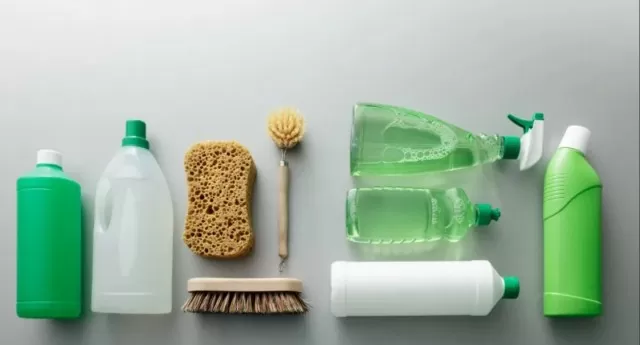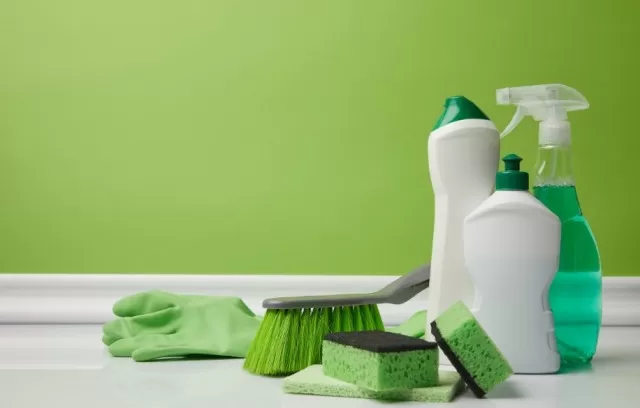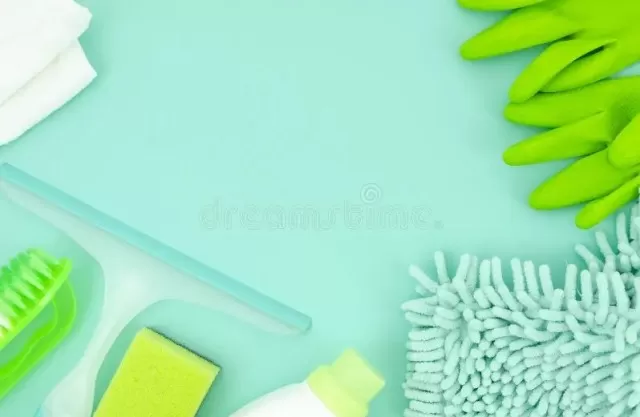In essence, green cleaning involves using products and methods that typically contain fewer harsh toxins than traditional cleaners.
When discussing green cleaning products, various terms like “biodegradable“, “chemical-free,” “eco-friendly,” and “less waste packaging” often come to mind.
While these associations are generally positive, it’s important to note that not all green cleaners possess all these qualities, and some buzzwords like “clean” and “natural” can be subjective and vague.
The use of harsh chemicals can have detrimental effects on human health and the environment as a whole.
While not all green or eco-friendly products are entirely chemical-free or completely harmless, they serve as a healthier alternative.
Allen Rathey, the director of the Indoor Health Council, advises that when there’s confusion about product labels, it’s essential to understand some definitions.
Green cleaning products should perform similarly to conventional ones but with a reduced negative impact on the environment and health. However, many products engage in greenwashing, using vague terms like “eco-friendly” or “natural” that don’t guarantee much.
Some brands obtain green certifications, which can indicate that their products are less harmful to people and the environment.
However, the value of certification depends on what is being certified, and it’s essential to read the fine print to know which claims are verified.
There are common assumptions about green cleaning products, such as being free from phosphates, chlorine, artificial fragrances, or colors, and having biodegradable or recyclable packaging.
People also often believe that green brands make donations to environmental causes or use plant-based ingredients grown sustainably. However, not all products or brands meet all these criteria.
While there’s a wide variety of definitions and practices associated with green cleaning, any efforts to reduce harm to the environment and promote sustainability are generally beneficial.
It’s crucial for consumers to be aware of what they’re buying and to rely on labels that provide accurate and specific information about the products they choose. Understanding the true characteristics of green cleaning products allows individuals to make more informed choices and contribute positively to the well-being of both people and the planet.
What do the labels on green cleaning products mean?

Green cleaning product labels are used to indicate that the products meet certain environmental and safety standards set by the United States Environmental Protection Agency (EPA).
For instance, the Safer Choice label is granted to products that undergo EPA’s evaluation process, ensuring that only the safest ingredients are used. However, some brands use multiple tags and certifications that may seem redundant at first glance.
Common product labels include “cruelty-free,” indicating that the products were not tested on animals, “eco-friendly,” suggesting that the product and its packaging are safe for the environment, “green,” implying that the products are safer for humans and the planet health, “sustainable,” indicating that the product provides long-term environmental, economic, and social benefits, “natural,” meaning it’s made from nature-derived ingredients, and “non-toxic,” suggesting that the product contains no harmful substances.
Although these label claims might be implied, they can sometimes be so broad that they become meaningless.
To ensure that green cleaning products are truly eco-friendly, it’s essential to look for specific certifications regulated by third-party entities. Some examples of reputable certifications are “Certified Organic,” indicating the absence of genetically modified organisms or synthetic fertilizers, “Certified Biobased,” showcasing the percentage of bio-based ingredients in the product, “Ecologo,” a third-party certification indicating reduced environmental impact, and “Green Seal,” a comprehensive evaluation of a product’s sustainability throughout its life cycle.
What is greenwashing?

Greenwashing refers to the deceptive use of eco-friendly claims on product packaging by companies.
It involves misleading consumers into believing that a product is environmentally friendly when, in reality, it offers no significant environmental benefit or advantage. For instance, labeling a detergent as “phosphate-free” when phosphate-free detergents are already standard can be considered greenwashing.
Similarly, if a product is labeled as “recyclable,” but it’s not recyclable in most recycling systems, it can be considered greenwashing.
Some companies may create their eco-friendly symbols or logos that lack institutional backing, further contributing to greenwashing practices.
Making the Best Eco-Friendly Cleaning Choice

When choosing eco-friendly cleaning products, there are several guidelines to consider.
Look for products with fewer ingredients and avoid those with long, complex names. Pay attention to signal words like “danger,” “warning,” or “caution,” as well as hazard and precautionary statements.
Be cautious with fragrances, dyes, and degreasing agents as key ingredients.
For concerned consumers, consulting Environmental Working Group consumer product reviews and tips on limiting exposure to chemicals from institutions like the Silent Spring Institute and Green Science Policy Institute can provide valuable insights.
Another eco-friendly option is making your cleaning products Using Vinegar and baking soda, reducing exposure to chemicals and cutting down on plastic waste.
Eliminating disposable plastics and adopting cloth-based alternatives, such as cloth diapers and cloth sanitary products, can also minimize chemical exposure. Websites like Trash is for Tossers and other zero-waste or plastic-free shops offer useful tips for phasing out plastics from your lifestyle.
*The information is for reference only.